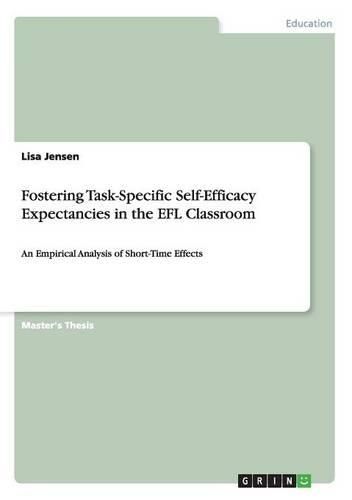Readings Newsletter
Become a Readings Member to make your shopping experience even easier.
Sign in or sign up for free!
You’re not far away from qualifying for FREE standard shipping within Australia
You’ve qualified for FREE standard shipping within Australia
The cart is loading…






Master’s Thesis from the year 2012 in the subject Pedagogy - Pedagogic Psychology, grade: 1,0, University of Hannover (Padagogische Psychologie), language: English, abstract: It is commonly known that one of the major factors for successful learning is the motivation to learn. The constant issue for teachers, therefore, is how they can motivate their students to want to learn. The primary motivation for any learning is interest in the subject. Since all humans are interested in different domains, it is unrealistic to expect school students to be interested in, on average, ten different subjects which they have to study according to school curricula. Consequently, teachers try to motivate their students extrinsically and it can safely be said that success is one of the major sources of extrinsic motivation. Generally, people like to do what they are good at. The opposite is also possible - the student is interested in the subject but lacks success and therefore becomes unmotivated. So, how can students succeed in subjects they are not overly inter�ested in or maintain their interest despite failures? Researchers in the field of educational psychology have been trying to find an answer to this question and many more questions concerning motivation theory. During the last few decades, the concept of self-efficacy has emerged and has become more important in research on learning. Simplified, self-efficacy is the confidence for being able to cope with tasks. It is said to be closely related to academic performance and to influence motivation by making the learner feel self-confident or insecure. The connection between self-efficacy and achievement has been researched in a number of studies, which will be summarized and discussed in an empirical research chapter. The influence of self-efficacy on motivation, however, has only theoretically been argued for. The research trying to show a causal relation between these two concepts is generally criticized for not measuring mo
$9.00 standard shipping within Australia
FREE standard shipping within Australia for orders over $100.00
Express & International shipping calculated at checkout
Master’s Thesis from the year 2012 in the subject Pedagogy - Pedagogic Psychology, grade: 1,0, University of Hannover (Padagogische Psychologie), language: English, abstract: It is commonly known that one of the major factors for successful learning is the motivation to learn. The constant issue for teachers, therefore, is how they can motivate their students to want to learn. The primary motivation for any learning is interest in the subject. Since all humans are interested in different domains, it is unrealistic to expect school students to be interested in, on average, ten different subjects which they have to study according to school curricula. Consequently, teachers try to motivate their students extrinsically and it can safely be said that success is one of the major sources of extrinsic motivation. Generally, people like to do what they are good at. The opposite is also possible - the student is interested in the subject but lacks success and therefore becomes unmotivated. So, how can students succeed in subjects they are not overly inter�ested in or maintain their interest despite failures? Researchers in the field of educational psychology have been trying to find an answer to this question and many more questions concerning motivation theory. During the last few decades, the concept of self-efficacy has emerged and has become more important in research on learning. Simplified, self-efficacy is the confidence for being able to cope with tasks. It is said to be closely related to academic performance and to influence motivation by making the learner feel self-confident or insecure. The connection between self-efficacy and achievement has been researched in a number of studies, which will be summarized and discussed in an empirical research chapter. The influence of self-efficacy on motivation, however, has only theoretically been argued for. The research trying to show a causal relation between these two concepts is generally criticized for not measuring mo